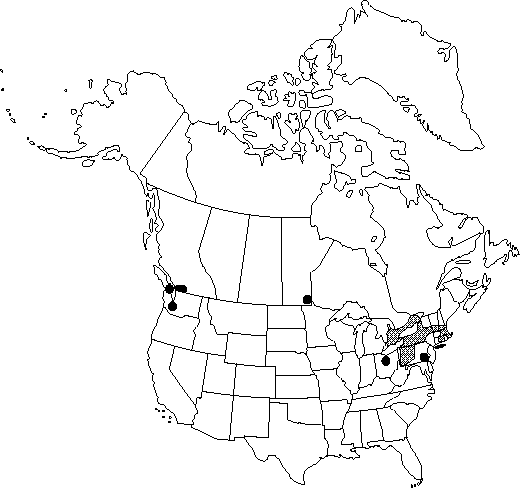Betula pendula
Tent. Fl. Germ. 1: 405. 1788.
Trees, to 25 m; trunks usually several, crowns spreading. Bark of mature trunks and branches creamy to silvery white, smooth, exfoliating as long strands; lenticels dark, horizontally expanded. Branches pendulous; twigs glabrous, usually dotted with small resinous glands. Leaf-blade broadly ovate to rhombic with 5–18 pairs of lateral-veins, 3–7 × 2.5–5 cm, base cuneate, rarely truncate, margins coarsely and sharply doubly serrate, apex acuminate; surfaces abaxially glabrous to sparsely pubescent, covered with minute, resinous glands. Infructescences erect to nearly pendulous, cylindric, 2–3.5 × 0.6–1 cm, shattering with fruits in fall; scales adaxially sparsely pubescent, lobes diverging at middle, central lobe obtuse, much shorter than lateral lobes, lateral lobes broad, rounded, extended. Samaras with wings much broader than body, broadest near center, extended beyond body apically. 2n = 28, 56.
Phenology: Flowering late spring.
Habitat: Abandoned plantings, roadsides, edges of bogs, waste places
Elevation: 0–350 m
Distribution

B.C., Man., Ont., Conn., Mass., N.H., N.Y., Ohio, Pa., Vt., Wash., Europe, Asia
Discussion
The Eurasian weeping birch (Betula pendula) is extensively cultivated throughout the temperate range of the flora, and it has been known to persist or to become locally naturalized in several areas, particularly in the Northeast. In vegetative features it resembles B. populifolia Marshall, to which it is closely allied; it can easily be distinguished from the latter by its peeling bark, as well as by its mostly pubescent leaves with somewhat shorter, acuminate apices.
Selected References
None.
Lower Taxa
"broad" is not a number."broadest" is not a number. "much broader" is not a number.